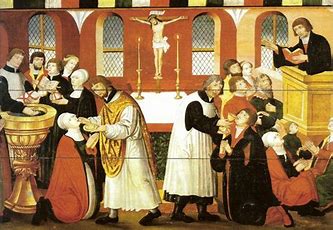This is an altar painting from Torlunde Church in Denmark and portrays the Lutheran concept of Word and Sacrament – it is from 1561
The questioning of why someone would not want their children baptized has a lot to do with the old human nature and our frustration with God as creatures and much of it can be seen in the Reformation struggles Luther had with the Roman Church. The reaction against Roman “superstition” made Lutheran’s want to draw back on some of the acts performed before the actual application of water. The action of the Reformed, all those who were not Lutheran, meant that Lutherans would have to react against any denial that baptism did anything. James Krikava said that the Lutheran Augsburg Confession is trying do two things – reason with a domineering mother (Rome) while disapproving of a rebellious brother, (the Reformed).
You can see in the reaction of Baptists and Methodist and the rest of the Reformed crowd that they have tried to maintain some kind of action that is identified as baptism while denying it’s power. Catholics have sought to maintain the power of baptism by changing some of the form. Lutherans sought to maintain the power of baptism as God’s action and most of us try hard to keep that reality alive. This is not magic performed by a priest and it is not an act to do something for God. It is a sacred act instituted by Christ that gives and seals and offers forgiveness won by Christ on the cross.
Down through the centuries the fight about baptism has gone on and Rationalism and the Enlightenment almost wiped out a Lutheran piety about baptism. It has returned and much of the original rite of Baptism is used in our churches. Most of the old form remains. Blowing under the child’s eyes, the salt, the Ephphatha, the oil are gone. As James Krikiva has said, “these ceremonies would not be called superstitions, but “visual aids”. They reinforce through the eyes what the words mean. All of the rites in the big rite of baptism want to explain, reinforce and help people see that God is working in the simple ceremony.
So the arguments over the years may have had an effect but my experience is that most folks who have a baby and I invite them to have the baby baptized have no clue about the age old battles over this important sacrament. They have no clue about a lot of things but this one is bothersome.
It you want a good read by a good theologian read our missionary in Eurasia, James Krikava’s monograph on “The Sacraments in Practice – A Path to Lutheran Identity”


